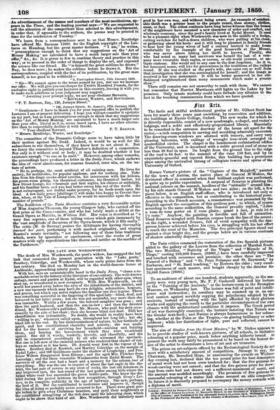THE LATE MRS. WORDSWORTH.
The death of Mrs. Wordsworth, the poet's widow, has snapped the last link that connected the present generation with the "Lake poets," Southey, Coleridge, and Wordsworth, whose early prime dates from the last century. She died on Monday last in the world-famous house at Ambleside, approaching ninety years.
With her, says an unmistakeable hand in the Daily News, "closes a re- markable scene in the history of the literature of our century. The well-known cottage, mount and garden at Rydal, will be regarded with other eyes, when shut up, or transferred to new occupants. With Mrs. Wordsworth an old world has passed away before the eyes of the inhabitants of the district, and a new one succeeds which may have its own delights, solemnities, honours, and graces, but which can never replace the familiar one that is gone. There was something mournful in the lingering of this aged lady—blind, deaf, and bereaved in her latter 'ears; but she was not mournful, any more than she was insensible. Within a few years, the beloved daughter was gone ; and then the aged husband, and then the son-in-law ; and then the devoted friend, Mr. Wordsworth's publisher, Mr. Moron' who paid his duty occa- sionally by the side of her chair ; then she became blind and deaf. Still her cheerfulness was indomitable. No doubt, she would in reality have been willing to go,' whenever called upon, throughout her long life ; but she liked life to the end. By her disinterestedness of nature, by her fortitude of spirit, and her constitutional elasticity and activity, she was quail- fed or the honour of surviving her household—nursing and burying them, and bearing the bereavement which they were vicariously spared. She did it wisely, tenderly, bravely, and cheerfully, and she will be remembered accoridngly by all who witnessed the spectacle. Not one is left now of the eminent persons who rendered that cluster of val- leys so eminent as it has been. Dr. Arnold went first in the vigour of his years. Southey died at Keswick, and Hartley Coleridge on the margin of Rydal Lake ; and th6 Quillinans under the shadow of Loughrigg; and Pro- fessor Wilson disappeared from Enemy ; and the aged Mrs. Fletcher from Lanerigg ; and the three venerable Wordsworths from Rydal Mount. The survivor of all the rest had a heart and a memory for the solemn last of everything. She was the one to inquire of about the last eagle in the dis- trict, the last pair of ravens in any crest of rocks, the last old dalesiman in any improved spot, the last round of the last pedlar among hills where the broad white road has succeeded the green bridle-path. She knew the dis- trict during the period between its first recognition, through Gray's Let- ters, to its complete publicity in the age of railways. She saw, perhaps, the best of it. But she contributed to modernise and improve it, though the idea of doing so probably- never occurred to her. There were great peo- ple before to give away Christmas bounties, and spoil their neighbours as the established almsgiving of the rich does spoil the labouring class which ought to be above that kind of aid. Mrs. Wordsworth did infinitely more good in her own way, and without being aware. An example of comfort- able thrift was a greater boon to the people round, than money, clothes, meat, or fuel. The oldest residents have long borne witness that the homes of the neighbours have assumed a new character of order and comfort, and wholesale economy, since the poet's family lived at Rydal Mount. It used to be a pleasant sight when Wordsworth was seen in the middle of a hedge, cutting switches for half-a-dozen children, who were pulling at his cloak, or gathering about his heels : and it will long be pleasant to family friends to hear how the young wives of half a century learned to make home comfortable by the example of the good housewife at the Mount, who was never above letting her thrift be known. Finally, she who had noted so many last survivors was herself the last of a com- pany more venerable than eagles, or ravens, or old-world yeomen, or an- tique cuatoats. She would not in any case be the first forgotten. As it is, her honoured name, will live for generations in the traditions of the valleys round. If she was studied as the poet's wife, she came out so well from that investigation that she was contemplated for herself; and the image so received is her true monument. It will be better preserved in her old- fashioned neighbourhood than many monuments which make a greater show."
There still remains one not unworthy to rank with these. We cannot but remember that Harriet Martineau still lights up the Lakes by her presence. Only innate modesty could have forbade any allusion to the fact in the touelling reminiscence from which we have quoted.






























 Previous page
Previous page